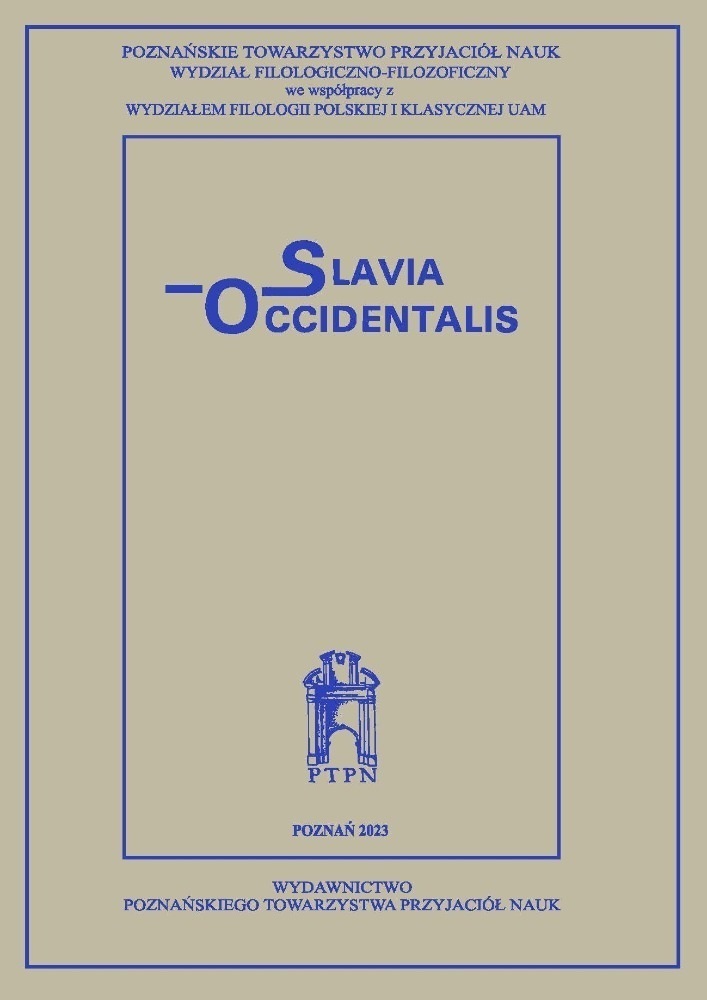Abstrakt
The aim of the article is to observe the similarities and differences concerning the formation of text by the writers of two Slavic Biblical-apocryphal narrations based on the analyses of the means of introduction of quotations in the Czech Život Krista Pána and in the Polish Żywot Pana Jezu Krysta by Baltazar Opec. The author of the article demonstrates that the texts were written at a similar stage of development of both vernacular languages and, consequently, they include structures at different levels of complexity – indirect speech coexists with direct speech and intermediate forms. The author indicates the differences and similarities in the way the metatext is constructed. For example, she contends that the author of ŽKP used direct speech much more often, introduced quotations serving as a commentary on specific events differently (e.g., from the Bible or Church Fathers), used different patterns when introducing the utterances of the protagonists of the story. Also, the author of the article shows that the quotations intertwined in the story Żywot Pana Jezu Krysta were more expensively modified in comparison to ŽKP. Moreover, the repertoire of structures used for the inclusion of reported speech into the main narration is richer in the Polish text.Bibliografia
Bieńkowska D., 2002, Składniowe cechy polskiego stylu biblijnego, w: Bieńkowska D., Polski styl biblijny, s. 113–123.
Borowiec K., 2015, W stronę badań słowiańskich kontekstów staropolskich apokryfów (1). O czeskiej podstawie fragmentu Rozmyślania przemyskiego, „Slavia Occidentalis. Seria inguistica”, 73/1, s. 7–26. DOI: https://doi.org/10.14746/so.2015.72.01
Borowiec K., 2016, Średniowieczny Život Krista Pána wobec Meditationes vitae Christi, „Bohemistyka”, nr 4, s. 313–340.
Carmignac J., 1987, Problem semityzmów w Ewangeliach synoptycznych, tłum. W. Rapak, „Ruch Biblijny i Liturgiczny” 6, s. 516–523. DOI: https://doi.org/10.21906/rbl.2123
Carruthers M., 2013, The Book of Memory. A Study of Memory in Medieval Culture. Second Edition, Cambridge.
Krążyńska Z., Mika T., Słoboda A., 2015, Składnia średniowiecznej polszczyzny. Część I. Konteksty – metody – tendencje, Poznań.
Kuźmicki M., 2015, Czynnik pamięciowy w powstawaniu tekstu średniowiecznego, „Polonica” 35, s.115–129. DOI: https://doi.org/10.17651/POLON.35.10
Mika T., 2012, „Kazania świętokrzyskie” – od rękopisu do zrozumienia tekstu, Poznań.
Mika T., 2015, Problemy z Rozmyślaniem przemyskim. Formułowanie sądów ogólnych a wielowarstwowość średniowiecznego tekstu, „LingVaria”, nr specjalny, s. 87–104. DOI: https://doi.org/10.12797/LV.10.2015.1SP.08
Mika T., Słoboda A., 2015, Wyrażenia funkcyjne w średniowiecznej polszczyźnie z perspektywy składniowej. Wybrane problemy badawcze, Poznań.
Pisarkowa K., 1978, Tekst o tekście w Kazaniach gnieźnieńskich, w: J. Twardzikowa (red.), Studia z polskiej składni historycznej II, Wrocław–Warszawa–Kraków–Gdańsk, s. 5–28.
Rojszczak-Robińska D., 2012, Jak pisano Rozmyślanie przemyskie, Poznań.
Truhlař J., 1884, O staročeském Životu Krista Pána a nově poznaném jeho zlomku, „Listy filologické” 11, s. 283–292.
Vilikovský J., 1948, Staročeský Passionál a Život Krista Pána, w: Písemnictví českěho středověku, Praha, s. 141–160.
Wolniewicz M., 1994, Wczoraj i dzisiaj w Biblii, Gniezno.
Wójcik R., 2014, Tłumacz, wykładacz, kompilator czy autor? Wokół kompozycji Żywota Pana Jezu Krysta Baltazara Opeca i jego stosunku do Meditaciones vite Christi, w: Baltazar Opec, Żywot Pana Jezu Krysta, W. Wydra i R. Wójcik (wyd. i wstępy), K. Krzak-Weiss (wstęp ikonograficzny), Poznań, s. XXXI–XCII.
Wydra W., 2014, Drukarstwo nasze nic podobnego później nie wydało, w: Baltazar Opec, Żywot Pana Jezu Krysta, W. Wydra i R. Wójcik (wyd. i wstępy), K. Krzak-Weiss (wstęp konograficzny), Poznań, s. XI–XXIX.
Ziółkowska O., 2016, Wokół składni „Rozmyślań dominikańskich” [praca doktorska przygotowana pod kierunkiem prof. UAM dra hab. Tomasza Miki], UAM Poznań.
Licencja

Utwór dostępny jest na licencji Creative Commons Uznanie autorstwa – Użycie niekomercyjne – Bez utworów zależnych 4.0 Międzynarodowe.
